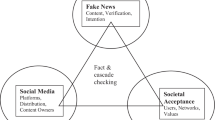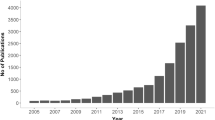Abstract
This study examined the effect of fake news on electoral outcome. Using post-election surveys, previous studies found associations between exposure to fake news and voting behavior, though these observational studies failed to show that these changes were actually caused by fake news. To examine whether fake news really affects voting behavior, we need to experimentally manipulate voters’ exposure to fake news in real elections and see if voters regret their vote choice knowing that the information was false. For this purpose, our study focused on Mexico’s 2018 presidential election, which provided an ideal setting. During the campaign, false information about a scandal allegedly involving Ricardo Anaya, a candidate from the National Action Party, was widely disseminated. However, his innocence was officially acknowledged after the election. Using this correction of fake news as a treatment, we tested a sample of 1,561 individuals to assess whether the retraction of fake news caused post-election regret: would Mexican voters have voted differently if they had not been exposed to such false information. Our multivariate analyses found that the retraction of fake news did cause post-election regret among voters with lower internal political efficacy, but voters associated with higher political knowledge and internal political efficacy were not affected by the retraction and were less likely to experience regret. About 20% of the respondents (N = 168) experienced post-election regret, and of those, about 35% would have switched their vote to Anaya. The findings corroborate lasting effects of fake news, which may have non-negligible effects on electoral outcomes.





Similar content being viewed by others
Data availability
The data used for the analyses of this article are openly available at (TBA).
Notes
In this paper, conservatism refers to political conservatism. More specifically, in political science, conservatism is a type of belief in prioritizing the observance of traditional values such as religion, social practices, and behavioral norms which have prevailed in a society. For instance, in the United States, conservatism tend to be associated with a belief in putting a higher value on family, the white as a racial majority, and Christianism as a dominant religion, which were observed in the traditional American society and have typically underlain the policy position of the Republican Party. Thus, the status-quo bias is generally observed in the policy of the Republican Party such as anti-immigration measures, the ban on abortion, and anti-gun control. The voters who support such position are characterized as conservative. We appreciate an anonymous reviewer for suggesting the importance of defining conservatism used in this paper.
In addition to the recent studies presented here, studies examining the effects of fake news on the U.S. local elections abound (e.g., Gastil et al., 2018) but there has been little examination of cases outside the U.S. Focusing on the 2019 presidential election in Indonesia, Mujani and Kuipers (2020) found that younger voters and those with higher levels of education and income were most likely to believe misinformation, findings that contrast with those of studies focused on the West.
More specifically, National Action Party (Partido Acción Nacional, PAN), the Party of the Democratic Revolution (Partido de la Revolución Democrática, PRD), and the Citizens’ Movement (Movimiento Ciudadano, MC) formed the electoral coalition “For Mexico to the Front.” The Institutional Revolutionary Party (Partido Revolucionario Institucional, PRI) allied with the New Alliance Party (Partido de Nueva Alianza, PANAL) and the Ecologist Green Party of Mexico (Partido Verde Ecologista de México, PVEM), forming “Everyone for Mexico.” “Together We Make History” was made up of the National Regeneration Movement (Movimiento de Regeneración Nacional, MORENA), the Labor Party (Partido del Trabajo, PT), and the Social Encounter Party (Partido de Encuentro Social, PES).
Blais and Kilibarda (2016, p. 761) state that regret “is a fundamental element of decision making” and analyze whether voters feel regretful for their voting decisions after an election.
The MEDW provides “online quota-based surveys that ensure samples are representative of the population in terms of age, gender, education, and region” (Blais & Kilibarda, 2016, p. 763). The dataset is available at https://dataverse.harvard.edu/dataverse/MEDW (Last accessed on July 6, 2021).
Correct voting is defined as “one that is the same as the choice which would have been made under conditions of full information” (Lau & Redlawsk, 1997).
Political efficacy means that “the feeling that one is capable of understanding political facts and processes and that one feels capable of influencing politics successfully” (Reichert 2016, p.2, emphasis in original). It is generally classified into external and internal efficacy. External political efficacy is generally defined as the perception that governments are responsible to citizens’ policy preferences.
The details of the project are described at https://verificado.mx/metodologia/ (Last accessed on June 1, 2021).
“Exoneran a Anaya,” Reforma, on March 5, 2019, https:// https://www.reforma.com/exoneran-a-anaya/ar1623566 (Last accessed on June 4, 2021).
The PGR was replaced by the Office of the Attorney General of the Republic (Fiscalía General de la República, FGR) on December 20, 2018. The sentence appeared in the following newspaper article: “PGR usó recursos contra Anaya y atentó contra equidad electoral TEPJF,” El Heraldo, on May 14, 2019, https://heraldodemexico.com.mx/pais/pgr-uso-recursos-contra-anaya-y-atento-contra-equidad-electoral-tepjf/ (Last accessed on April 11, 2021).
“Señalan ilegalidad de PGR en caso Anaya,” Reforma, on May 15, 2019. https://www.reforma.com/senalan-ilegalidad-de-pgr-en-caso-anaya/ar1678063 (Last accessed on June 4, 2021).
Since this is an experimental study, we consider that random assignments assure that “all three groups had knowledge of the ‘fake’ news.” Thus, it would be reasonable to claim that the average treatment effects estimated by random assignments were interpreted as causal effects, not correlations. We appreciate an anonymous reviewer for suggesting the importance of making clear this assumption.
To measure participants’ knowledge, we asked the respondents about the name of the Secretary of Finance, the unemployment rate, and the second-largest party in the Chamber of Deputies after the 2018 federal election. Then, we used the number of correct answers added together as a measure of knowledge, with a larger value representing a greater degree of knowledge.
We admit that the non-demographic variables collected through our online survey are self-reported and thus may entails the perils of diminishing both validity and reliability. We believe that our data still hold the validity of the measures and reliability for the following reasons. First, as for the validity, we carefully recruited the respondents by using quota sampling to purposively select Mexican people by age and gender so that the sample represent the national population (p.12). Then, to measure the non-demographic variables, for instance, ideology, we were able to obtain the mean and variance within the sample. As long as the sample is unbiased, we believe that the data constructed by self-reporting is valid. Second, we admit that particularly self-reported data may change depending on the timing of conducting the survey. For instance, the same person may give a different response regarding the degree of support for a certain party between in good and bad economic conditions. Although we need to repeat sampling to assure the data reliability, however, we can assume that such contextual effect might affect all the respondents evenly. We appreciate an anonymous reviewer for addressing the fundamental problem pertinent to survey.
Figure A1 in the online appendix shows the results of additional balance tests comparing the absolute values of the maximum standardized bias of all the covariates. This suggests no significant problem of covariate imbalance.
As is explained in Table A.1 of the Online Appendix, ideology was measured using an 11-point scale taking values ranging from 0 (the left) to 10 (the right). Strength of Ideology was calculated as follows. First, we subtracted 5 from the Ideology score. Then, we took their absolute value. In other words, Strength of Ideology means the intensity of one’s belief in a specific ideology regardless of the political orientation (left or right).
Although the interaction term included the variable (internal political efficacy) which was created using the self-reported data, we consider that our data still hold the validity of the measures and reliability for the same reasons stated in the footnote 14.
We are grateful to an anonymous reviewer for pointing out this issue of reliability.
We acknowledge the reviewer for suggesting the possibility that we were not aware of in writing the paper.
References
Blais A, Kilibarda A (2016) Correct voting and post-election regret. PS Polit Sci Polit 49:761–765. https://doi.org/10.1017/S1049096516001372
Bovet A, Makse HA (2019) Influence of fake news in Twitter during the 2016 US presidential election. Nat Commun 10:1–14. https://doi.org/10.1038/s41467-018-07761-2
Carnahan D, Bergan DE, Lee S (2021) Do corrective effects last? Results from a longitudinal experiment on beliefs toward immigration in the U.S. Polit Behav 43:1227–1246. https://doi.org/10.1007/s11109-020-09591-9
Cohen J (1988) Statistical power analysis for the behavioral sciences. Routledge, London
Ecker UKH, Ang LC (2019) Political attitudes and the processing of misinformation corrections. Polit Psychol 40:241–260. https://doi.org/10.1111/pops.12494
Ecker UKH, Lewandowsky SF, Martin K (2014) Do people keep believing because they want to? Preexisting attitudes and the continued influence of misinformation. Mem Cognit 42:292–304. https://doi.org/10.3758/s13421-013-0358-x
Gastil J, Reedy J, Wells C (2018) Knowledge distortion in direct democracy: a longitudinal study of biased empirical beliefs on statewide ballot measures. Int J Public Opin Res 30:540–560. https://doi.org/10.1093/ijpor/edx012
Guess A, Nagler J, Tucker J (2019) Less than you think: prevalence and predictors of fake news dissemination on Facebook. Sci Adv 5:EAAU4586. https://doi.org/10.1126/sciadv.aau4586
Gunther R, Beck PA, Nisbet EC (2019) “Fake news” and the defection of 2012 Obama voters in the 2016 presidential election. Elect Stud 61:102030. https://doi.org/10.1016/j.electstud.2019.03.006
Institute Nacional Electoral (INE) (2019) Presenta INE modelo de combate a la desinformación en elecciones 2018–2019. Comunicados de prensa 215. https://centralelectoral.ine.mx/2019/07/18/presenta-ine-modelo-combate-la-desinformacion-elecciones-2018-2019/. Accessed 4 June 2021
Kunda Z (1987) Motivated inference: Self-serving generation and evaluation of causal theories. J Pers Soc Psychol 53:636–647. https://doi.org/10.1037/0022-3514.53.4.636
Lau RR, Redlawsk DP (1997) Voting correctly. Am Polit Sci Rev 91:585–598. https://doi.org/10.2307/2952076
Lazer DMJ, Baum MA, Benkler Y, Berinsky AJ, Greenhill KM, Menczer F, Metzger MJ, Nyhan B, Pennycook G, Rothschild D, Schudson M, Sloman SA, Sunstein CR, Thorson EA, Watts DJ, Zittrain JL (2018) The science of fake news: addressing fake news requires a multidisciplinary effort. Science 359:1094–1096. https://doi.org/10.1126/science.aao2998
Lewandowsky S, Ecker UKH, Seifert CM, Schwarz N, Cook J (2012) Misinformation and its correction: continued influence and successful debiasing. Psychol Sci Public Interest 13:106–131. https://doi.org/10.1177/1529100612451018
Leyva R, Beckett C (2020) Testing and unpacking the effects of digital fake news: on presidential candidate evaluations and voter support. AI Soc 35:969–980. https://doi.org/10.1007/s00146-020-00980-6
Lupia A, McCubbins MD (1998) The democratic dilemma: can citizens learn what they need to know? Dissertation, University of Cambridge
Miller J, Krosnick J (2000) News media impact on the ingredients of presidential evaluations: politically knowledgeable citizens are guided by a trusted source. Am J Pol Sci 44:301–315. https://doi.org/10.2307/2669312
Mujani A, Kuipers N (2020) Who believed misinformation during the 2019 Indonesian election? Asian Surv 60:1029–1043. https://doi.org/10.1525/AS.2020.60.6.1029
Nir L (2011) Motivated reasoning and public opinion perception. Public Opin Q 75:504–553. https://doi.org/10.1093/poq/nfq076
Nyhan B, Reifler J (2010) When corrections fail: the persistence of political misperceptions. Polit Behav 32:303–330. https://doi.org/10.1007/s11109-010-9112-2
Peterson E, Iyengar S (2021) Partisan gaps in political information and information-seeking behavior: motivated reasoning or cheerleading? Am J Pol Sci 65:133–147. https://doi.org/10.1111/ajps.12535
Redlawsk DP (2002) Hot cognition or cool consideration? Testing the effects of motivated reasoning on political decision making. J Polit 64:1021–1044. https://doi.org/10.1111/1468-2508.00161
Reichert F (2016) How internal political efficacy translates political knowledge into political participation. Evidence from Germany. Eur J Psychol 12:221–241. https://doi.org/10.5964/ejop.v12i2.1095
Taber CS, Lodge M (2006) Motivated skepticism in the evaluation of political beliefs. Am J Pol Sci 50:755–769. https://doi.org/10.1111/j.1540-5907.2006.00214.x
Vosoughi S, Deb Roy D, Aral S (2018) The spread of true and false news online. Science 359:1146–1151. https://doi.org/10.1126/science.aap9559
Wan TL (2020) Does fake news matter to election outcomes? The case study of Taiwan’s 2018 local elections. Asian J Public Opin Res 8:67–104. https://doi.org/10.1520/ajpor.2020.8.2.67
Acknowledgements
Earlier versions of this article were presented at the VIII Congress of the Asociación Latinoamericana de Investigadores en Campañas Electorales (ALICE), October 27–30, 2020 (online) and the Annual Meeting of the Japanese Association of Electoral Studies, May 8–9, 2021 (online), the 2021 Annual Meeting of the American Political Science Association, September 30–October 3, 2021 (online). We would like to thank Rieko Kage, Hiroto Katsumata, and the participants in the meetings for helpful comments; Masaki Hara, Tetsuro Kobayashi, and the members of the research group on electoral governance and correct voting led by Yutaka Onishi for suggestions for the development of the project; and Gianco Pérez Velasco for research assistance. Any remaining errors are the authors’ own responsibility.
Funding
This project was funded by JSPS KAKENHI Grant Numbers 19H00582 and 19K21685.
Author information
Authors and Affiliations
Contributions
TI: Conceptualization and Methodology; JS: Methodology, Formal Analysis, Investigation, and Visualization; JLE: Conceptualization and Resources; YT: Conceptualization, Investigation, Resources, Writing—Original Draft, and Project Administration.
Corresponding author
Ethics declarations
Conflict of interest
The authors declare there are no conflicts of interest.
IRB
This research has been reviewed in line with the procedures of the Institutional Review Board of Kobe University of Japan for academic research using personal data (# 31012).
Additional information
Publisher's Note
Springer Nature remains neutral with regard to jurisdictional claims in published maps and institutional affiliations.
Supplementary Information
Below is the link to the electronic supplementary material.
Rights and permissions
About this article
Cite this article
Iida, T., Song, J., Estrada, J.L. et al. Fake news and its electoral consequences: a survey experiment on Mexico. AI & Soc (2022). https://doi.org/10.1007/s00146-022-01541-9
Received:
Accepted:
Published:
DOI: https://doi.org/10.1007/s00146-022-01541-9




